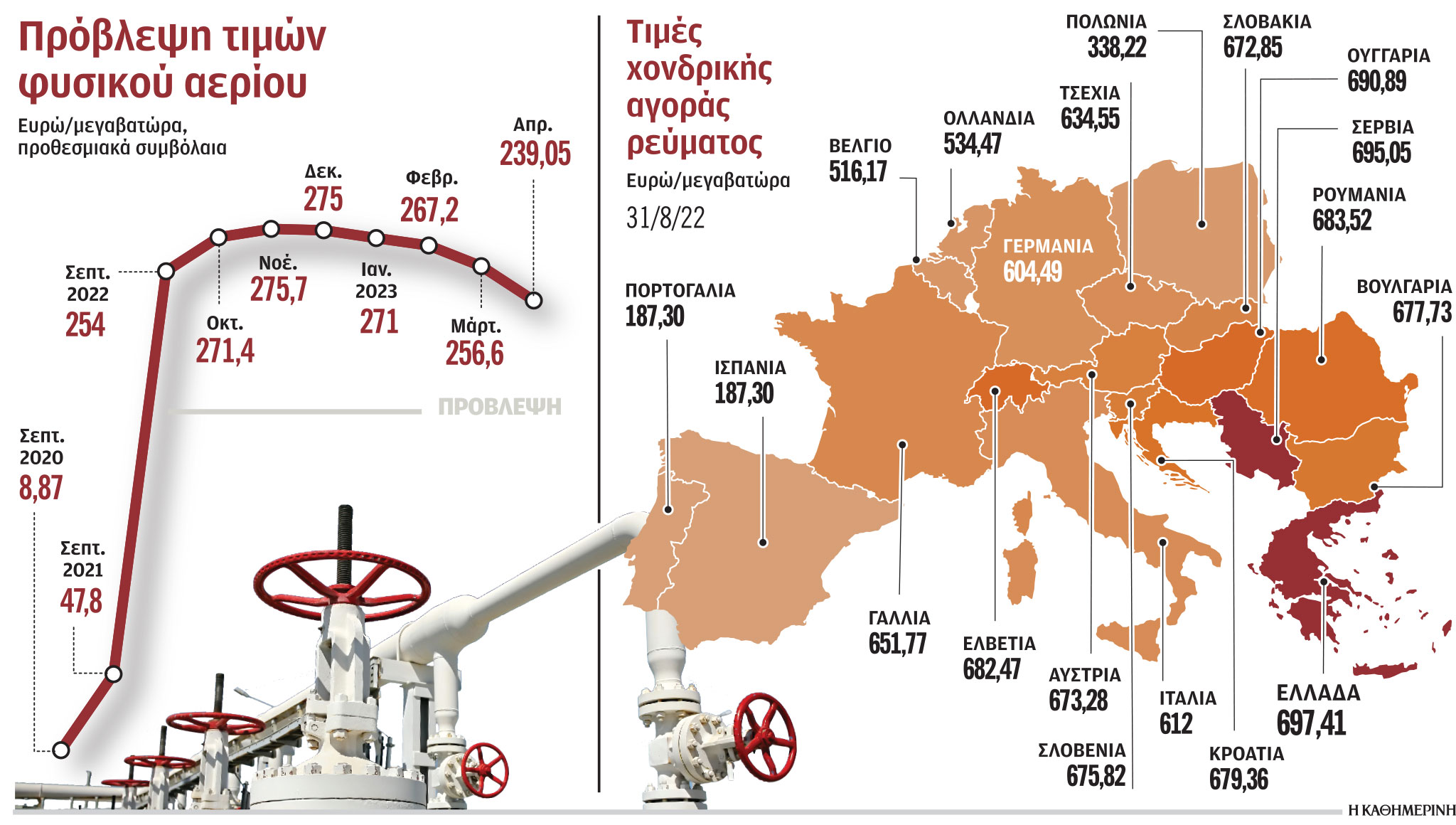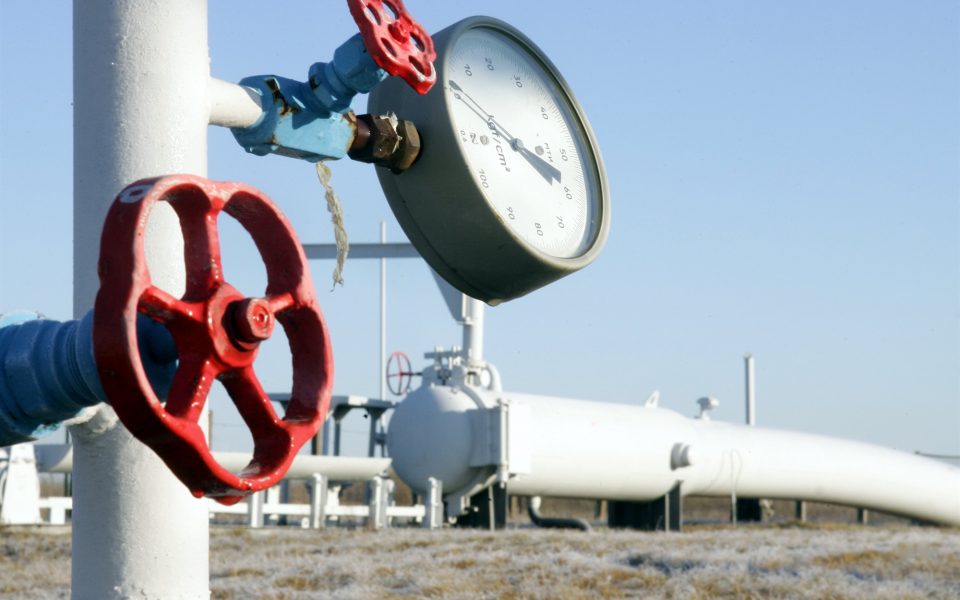
Immediate interventions in pan-European level The EU is rushing to get ahead of the worst as an energy crisis threatens to destabilize Europe’s strongest economic pillars and leaves the “king” of the European economy highly dependent on Russia natural gas Germany.
Loud and many times dismissive reactions to proposals from Greece and other countries of the South for ceiling overlay in natural gas prices and separating them from prices electricitytoday are taking the initiative to intervene directly in this direction, a request which, with a delay of at least seven months, seems to have also been accepted by the EU.
Chairman of the Commission Ursula von der Leyen announced EE’s intention yesterday for “urgent intervention and structural reform of the electricity market”, and yesterday the German finance minister told his European counterparts in a written communication that Berlin may consider imposing a natural gas price cap on September 9, when extraordinary meeting of energy ministers.
Everyone is now talking about the need for a European solution, about a request, Hellas expressed through the Prime Minister Kyriakou Mitsotakis since October last year, with this scenario of the introduction of a price ceiling for natural gas and the separation of gas and electricity prices are in the spotlight, and the relevant EU staff and Member States to weigh the pros and cons. What is needed is the most effective measure that will restore some balance to the natural gas market and lead to a de-escalation of prices, correcting the impact on prices. electricitywhich, of course, requires the consent of member countries.
In this difficult exercise, Europe begins with the confidence that any action it takes will also elicit an immediate reaction from it. Russia. He also did not take into account that, regardless of the position of the EU, Russia will continue to reduce gas flows, each time naming the reason, continuing the policy of reductions, which began with the threat of payment in rubles, continued by him. Nord Stream 1 pipeline which will finally restart on 3 September instead of 2 September and with limited gas supplies to the French engine.
Ahead of a meeting of EU energy ministers, central and individual countries are assessing the consequences of a tough Russian response, such as a complete halt in gas supplies. On September 9, however, the prevailing view is that Europe must respond, without ideologies or taboos, to the necessary interventions in the natural gas and electricity markets. “We have reached a point where no improvement is visible, and that is why we also see that large European countries are demanding structural changes in the market. After all, we are not going to violate the optimal or very good. Let’s dive into the unreal, namely the prices we’ve been seeing over the past few weeks.” refers to “K” factor with knowledge of negotiations. According to him, neither the TTF system developed over the past ten years nor the target model should be considered as a bible.
The consequences of Moscow’s harsh reaction are being assessed, for example, the complete cessation of gas flows.
Scripts
Two main groups have formed around the setting of a natural gas price ceiling within the EU.
One that supported the imposition of a tariff on Russian natural gas imports to hurt Russia’s revenues, but which was not passed because it would violate contracts with Gazprom without mandatory price restrictions.
The second one that returned to the discussion is the imposition of a restriction on the Dutch TTF. Some countries are concerned about the side effects this could cause and will have to be persuaded, while others a priori oppose any market intervention.
But even countries that support the restriction recognize that there are growing barriers and side effects to its implementation that should be explored and assessed. First, there is no legal basis for intervention because TTF is a private company. Interventions are being explored by government and EU advisers.
However, the biggest concern is the market reaction and the very likely possibility of adequacy issues. “If we set a ceiling of 200 euros/MWh and the LNG seller can sell it somewhere even more expensive, then why would he ship it to Europe?” the risks of insufficiency that the application of the measure may cause.
Such a measure, according to other market participants, can be regarded by Russia as a violation of agreements with Gazprom’s European customers, which charge fees on the basis of TTF and lead to a complete cessation of Russian gas supplies, which, in addition to problems with adequacy, will also cause a new surge in prices. One of the questions that also needs to be answered is at what price the ceiling will be set, for how long and on what basis it will be redefined.
Model of the Iberian Peninsula and the Greek proposal
The proposal to set a ceiling on natural gas used for electricity generation, in line with the model used in the countries of the Iberian Peninsula, seems to be gaining more acceptance. It seems to be Berlin’s proposal at the September 9 meeting, although it has been strongly resisted in the past. Although the share of natural gas in Germany’s electricity generation is limited to 19-20%, the lowering of rivers in the summer and the difficulty in transporting coal cargoes to operate coal-fired power plants have significantly increased the use of natural gas. which also determines the price of the system, causing prices to skyrocket in the wholesale market and to historical levels (over 1,000 EUR/MWh) in forward contracts. The main issue that needs to be resolved for the pan-European implementation of the Iberian model is its financing. In other words, by covering the difference between the price that will be set as a ceiling on natural gas for electricity generation and the price of imports. This amount, which will increase as the exchange prices of natural gas rise, since they will not be affected by this measure, must be covered either from the state budget or from funds to be provided by the EU. centrally. “It’s like subsidizing speculation, like you’re burning money instead of gas,” he said. market agent reports “K”.
• Greek proposal. Some describe the ideal model as intervening on three levels simultaneously: consumption reduction, TTF intervention, and decoupling the price of natural gas from the price of electricity. Greece is expected to return at the September 9 meeting its proposal to reduce industrial consumption of natural gas in exchange for compensation. On the eve of the session, negotiations are feverishly ongoing, and explanations of the EU’s position are awaited with interest.
Germany, the most vulnerable country in the energy crisis
It took many months, and Germany was in irrevocable danger of finding a single European solution to the energy crisis. Since the 1970s, when the first Russian gas imports began, paying with steel pipes manufactured by Thyssen-Krupp, which were then absolutely necessary for the Soviet Union to develop its own gas and oil networks, Germany has gradually and more intensively strengthened its energy. connections with Moscow. Together with ally Gazprom, he pre-planned natural gas transportation corridors to bypass the troubled Ukrainian corridor, Nord Stream 1 and Nord Stream 2 (although the latter was never commissioned) and secured preferential terms for Russian gas supplies. . Cheap Russian gas has supported strong industrial production in Germany, which accounts for almost 30% of Germany’s GDP, and is now threatened by high gas prices and supply shortages.
High dependence on Russian gas (55% before the start of the war in Ukraine and 35% today) is the price that Germany pays today, the economy of which is most vulnerable to the energy crisis of the EU countries. and which, if it finds itself in recession, will drag down the whole of Europe, since its economy makes up a quarter of the GDP of the countries of the European bloc. Today’s Germany is nothing like the financial crisis that shook its finger at the “unruly” South. It is she who appeals to European solidarity, while Olaf Solz repeats in a dramatic tone about domino effects and the risk of an unprecedented recession, which he likens to the crisis caused by the collapse of Lehman Brothers in 2008. electricity prices have changed the daily lives of German citizens through voluntary and mandatory measures to reduce consumption and put Chancellor Olaf Scholz and the ruling coalition in a difficult position.
Source: Kathimerini
Lori Barajas is an accomplished journalist, known for her insightful and thought-provoking writing on economy. She currently works as a writer at 247 news reel. With a passion for understanding the economy, Lori’s writing delves deep into the financial issues that matter most, providing readers with a unique perspective on current events.